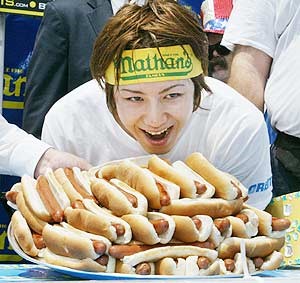
To listen to this reflection as a podcast, click here.
“Your legs are thinner than my arms!”
That’s how one of the contestants at Nathan’s Hot Dog eating contest on Coney Island on July 4, 2001, mocked the new guy.
The new guy was Takeru Kobayashi, a 23-year-old Japanese economics student who had taken up competitive eating as a way to pay his light bill. Kobi, as he came to be called, stood 5 feet 8 inches. He looked frail compared to the human Sasquatches who typically dominated the contest.
He wasn’t even what one might call a big eater – definitely not an asset in which the main point is to slam as many hot dogs as possible.
No one suspected that Kobi was about to revolutionize this strange sport.
Nathan’s keeps score according to HDBs (hot-dog-and-buns) consumed in 12 minutes (since reduced to 10 minutes). In 2001 the record stood at 25 and 1/8. The numbers hadn’t varied much for a few years, and many suspected that humanity might be bumping up against the mystical Hot Dog Ceiling.
Any condiments are fair game, and contestants can also drink anything they want. But who would want to fill up on pickle relish and lemonade?
When the contest began, Kobi did things no one had ever seen before.
He broke each hot dog in half. He ate the meat by itself. He dipped the pieces of bun into a glass of water, squeezed out the liquid, and smooshed the remaining soggy mess into his mouth. And from time to time he would jump up and down and wriggle his body, something that became known as the Kobayashi Shake.
Kobi didn’t just win or break the HDB record that day. He pulverized it. The Nathan’s girl who held up his tally had to hand-write the numbers past 30 hot dogs, since no one had thought to pre-print them.
At the end of 12 minutes he had eaten 50 HDBs, doubling the world record. That’s more than four whole hot dogs every minute. This was equivalent to a baseball player coming out of nowhere and hitting 140 home runs in a season, or an Indy car suddenly going 450 miles per hour at the Indianapolis Motor Speedway. Surely he had cheated.
Inquiring hot dog minds wanted to know: Had he swallowed stones to enlarge his stomach? Had a doctor surgically implanted a second esophagus?
Actually, what Kobi had done was considerably simpler. As he addressed the problem of winning the hot-dog eating contest, he changed the question. The old question had been: “How can I eat more hot dogs?” Kobi asked instead: “How can I make hot-dog eating easier?”
His physiology put him at a disadvantage under the limits of the old question. But by going at the problem from an entirely new angle, he suddenly found he had a striking advantage.
His brain, in other words, turned out to be more critical than his stomach.
Takeru “Tsunami” Kobayashi went on to win the next five July 4 contests at Nathan’s. Because of a 2010 contract dispute with Nathan’s, he ultimately passed his crown to the American Joey “Jaws” Chestnut, who will be going for his 16th win in the Coney Island competition today, and who owns the current HDB world record of 76.
No one doubts, however, that Kobi paved the way for Chestnut. He revolutionized competitive eating and gave it global exposure for the first time.
He currently holds the world records for 13 grilled cheese sandwiches in 60 seconds; 62 slices of pizza (that’s 15 and a half whole pizzas) in 12 minutes; and 57 cow brains in 15 minutes – which we can only imagine must have been a quarter-hour to remember.
Steven D. Levitt and Stephen J. Dubner, the economists of “Freakonomics” fame, point out that amazing things can happen when we refuse to abide by artificially imposed limits.
“All of us face barriers – physical, financial, temporal – every day. Some are unquestionably real. But others are plainly artificial – expectations about how well a given system can function, or how much change is too much, or what kinds of behaviors are acceptable. The next time you encounter such a barrier, imposed by people who lack your imagination and drive and creativity, think hard about ignoring it. Solving a problem is hard enough; it gets that much harder if you’ve decided beforehand it can’t be done.”
The apostle Paul was almost certainly not thinking about hot dogs or grilled cheese sandwiches when he wrote Ephesians 3:20-21:
“Now to him who is able to do immeasurably more than all we ask or imagine, according to his power that is at work within us, to him be glory…forever and ever!”
Followers of Jesus cite that verse rather often, and for good reason.
Day by day, we can place ourselves in the service of a God whose power can blow away barriers.
Which means we’re genuinely free to dream far bigger dreams, and to shatter old barriers, when it comes to helping heal this broken world.
